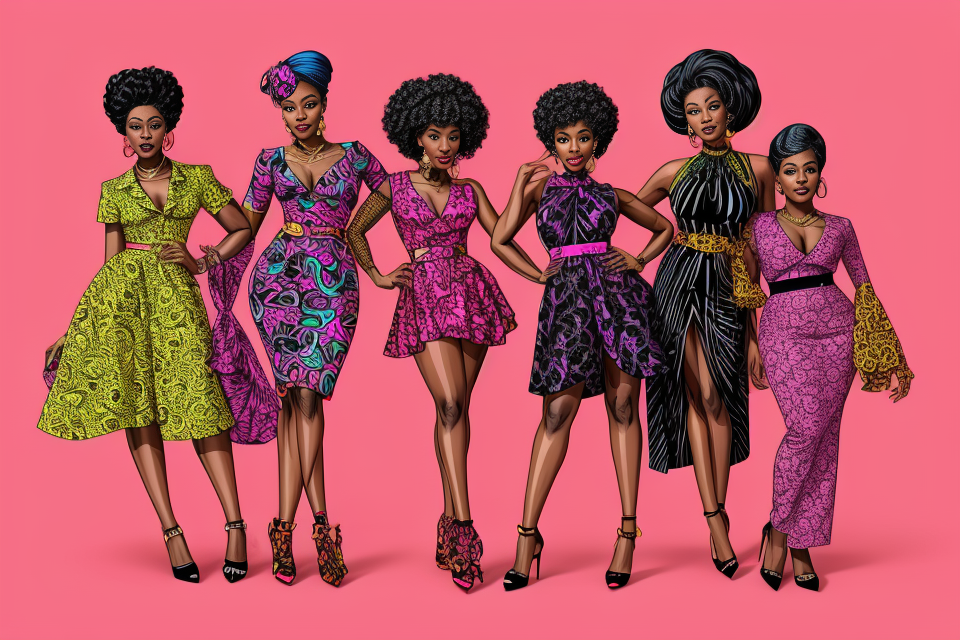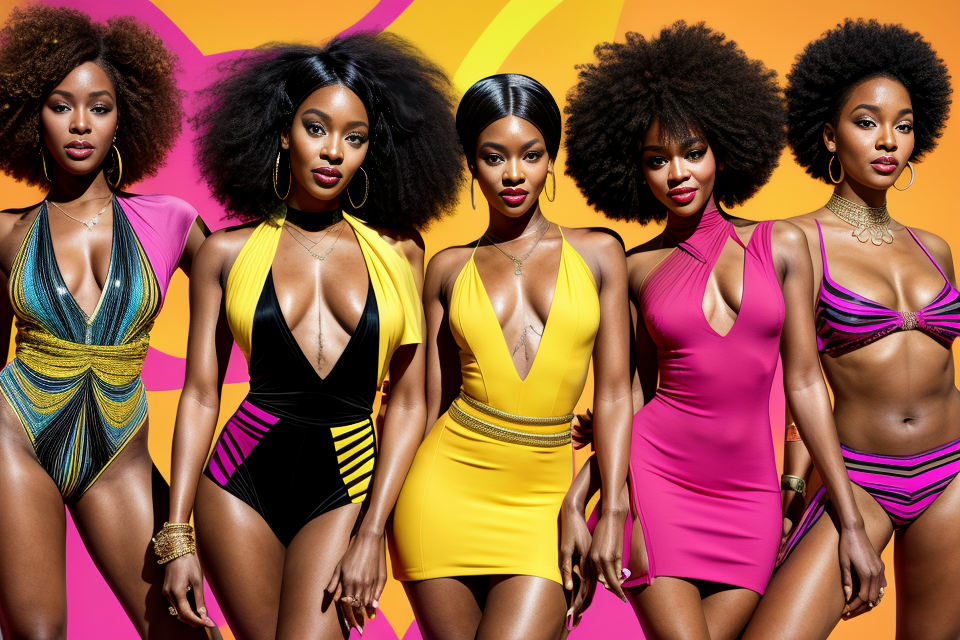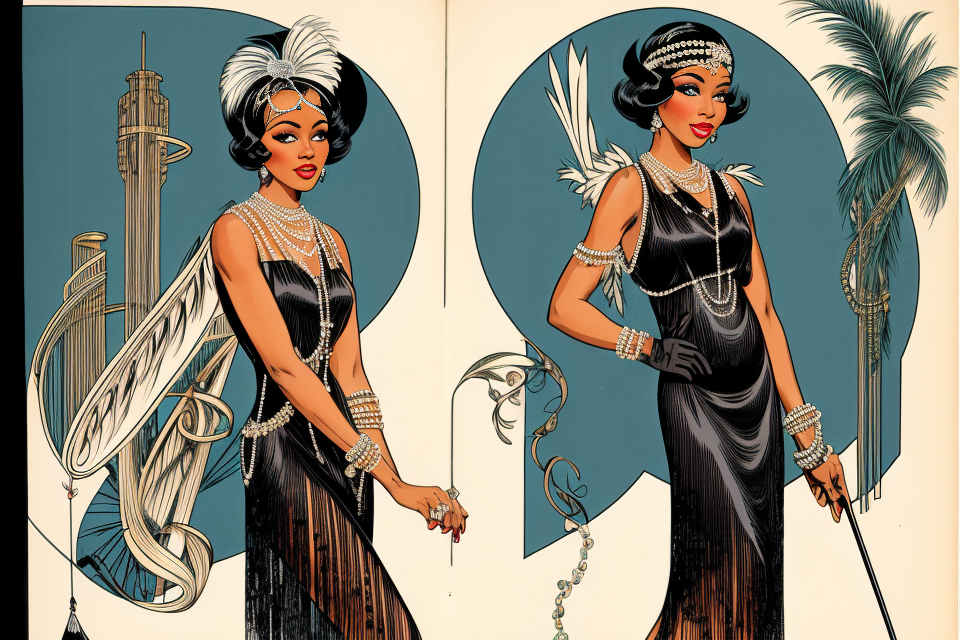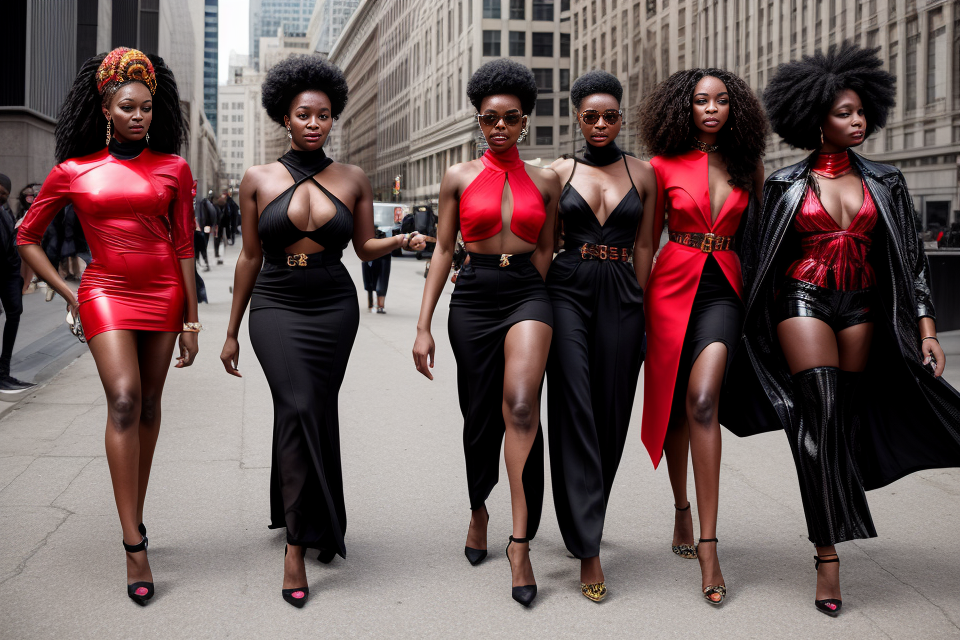From the blinged-out crowns of ancient African queens to the modern-day street style of today’s black influencers, black women have played a crucial role in shaping the fashion industry. Despite facing discrimination and marginalization, black women have consistently used their creativity and innovation to create some of the most iconic and enduring fashion trends of all time. From natural hairstyles to bold colors and daring silhouettes, this article will explore the fascinating history of black women’s contributions to the world of fashion. Get ready to discover the incredible stories behind some of the most iconic styles of all time, and learn how black women have consistently pushed the boundaries of fashion and beauty.
The Origins of Black Fashion
The Impact of Slavery on Fashion
The use of African textiles and fabrics
During the period of slavery, African textiles and fabrics were often used to create clothing for enslaved people. These fabrics were often colorful and intricately patterned, and were used to make a variety of garments, including tunics, robes, and turbans. Some of these fabrics were imported from Africa, while others were produced locally in the Americas.
The adaptation of European fashion for African markets
European fashion was also adapted for African markets during the period of slavery. European traders and merchants would bring their latest fashion trends to the colonies, and these styles would be adapted for the local market. For example, European women’s dresses were often modified to suit the climate and lifestyle of the colonies, with more relaxed cuts and lighter fabrics. These adapted styles were then worn by both enslaved and free African women.
Overall, the fashion trends created during the period of slavery were a reflection of the cultural exchange between Africa and the Americas. The use of African textiles and the adaptation of European fashion for African markets helped to create a unique style that was both culturally rich and aesthetically pleasing.
The Development of Black Fashion during the Civil Rights Movement
The emergence of black designers and models
During the Civil Rights Movement, black designers and models began to emerge, breaking down barriers and stereotypes within the fashion industry. Designers such as Patrick Kelly, who was the first American designer to show his collection in Paris, and Willi Smith, who founded the fashion label WilliWear with his partner, created clothing that was both stylish and culturally significant.
The role of fashion in protest and activism
Fashion played a crucial role in the Civil Rights Movement as a form of protest and activism. Black women used fashion as a way to express their identity and resistance against racial discrimination. For example, women would wear Afros and dashikis as a symbol of black pride and solidarity.
In addition, fashion was used as a tool to raise awareness about social and political issues. For instance, the Black Panther Party created their own clothing line, which featured the party’s symbol, the black power fist, as a way to spread their message and promote their cause.
These developments in black fashion during the Civil Rights Movement paved the way for future generations of black designers and models, and solidified the importance of fashion as a form of self-expression and activism within the black community.
Black Hairstyles: A Form of Self-Expression
The History of Black Hairstyles
Black hairstyles have been a form of self-expression for black women throughout history. They have used their hair as a way to express their cultural identity and to resist oppression. The history of black hairstyles is deeply rooted in the cultural practices of African societies, the impact of slavery, and the fight for racial equality.
The significance of natural hair in African cultures
In African cultures, natural hair was seen as a symbol of beauty and cultural identity. Women would often decorate their hair with beads, shells, and other natural materials to enhance their appearance. Natural hair was also seen as a reflection of a woman’s social status and personal hygiene. In some cultures, the length and texture of a woman’s hair was a sign of her age and maturity.
The impact of slavery on black hair
With the transatlantic slave trade, black hairstyles underwent a significant change. Slaves were often forced to adopt the hairstyles of their white masters, which included shaving the head or wearing wigs. This led to a loss of cultural identity and a sense of shame towards natural black hair.
Despite this, black women continued to find ways to express their cultural identity through their hair. They would often use techniques such as braiding, twisting, and styling to create intricate and unique hairstyles. These hairstyles became a symbol of resistance against slavery and a way to maintain a connection to their cultural roots.
The civil rights movement and the afro
During the civil rights movement of the 1960s, black hairstyles underwent a significant change. The afro, a hairstyle that emphasized the natural texture and volume of black hair, became a symbol of black pride and self-expression. This hairstyle was seen as a way to reject the Eurocentric beauty standards that had been imposed on black people and to embrace their natural hair.
The afro was worn by many prominent black figures, including Malcolm X and Angela Davis, and became a symbol of the black power movement. It was also embraced by the wider black community, with many women choosing to wear their hair in this style as a way to express their cultural identity and resistance against oppression.
Overall, the history of black hairstyles is a testament to the resilience and creativity of black women in the face of oppression. Throughout history, they have used their hair as a form of self-expression and resistance, and continue to do so today.
Popular Black Hairstyles Throughout History
Black women have historically used their hairstyles as a form of self-expression and resistance against societal expectations. Over the years, various popular hairstyles have emerged, reflecting the evolving identity and aspirations of Black women. Some of the most significant and influential hairstyles in Black history include:
Afros and the Black Pride Movement
During the 1960s and 1970s, the Afro hairstyle became a symbol of Black pride and identity. As Black people began to embrace their natural hair texture and challenge White beauty standards, the Afro hairstyle gained widespread popularity. This hairstyle represented a rejection of the chemical straighteners and hot combs that had been used for decades to make Black hair conform to White beauty ideals. The Afro was not only a fashion statement but also a political one, as it represented a newfound sense of self-esteem and pride among Black people.
The Emergence of the Wash and Set Culture
In the 1980s and 1990s, the wash and set hairstyle became popular among Black women. This hairstyle involved the use of a press or hot comb to smooth and style the hair after washing it. The wash and set culture emerged as a response to the increasing commercialization of Black hair care products and the rise of salons that catered to Black women. The wash and set was not only a practical way to maintain the natural texture of Black hair but also a cultural practice that brought Black women together and provided them with a sense of community and shared experience.
Throughout history, Black women have used their hairstyles to express their identity, assert their agency, and challenge societal expectations. The popularity of these hairstyles has been influenced by various social, political, and economic factors, and they have often served as a form of resistance against racism and discrimination.
Black Fashion Icons
The Impact of Black Women on Fashion
Black women have played a significant role in shaping the fashion industry. From modeling to design, their impact has been enormous. Here are some ways in which black women have made their mark on fashion.
The rise of black supermodels
Black supermodels have been breaking barriers in the fashion industry since the 1960s. The first black supermodel, Naomi Campbell, hit the runway in 1988, and since then, many other black models have followed in her footsteps. Black supermodels like Tyra Banks, Iman, and Beverly Johnson have helped to change the way that the fashion industry views beauty. They have shown that black women can be just as beautiful and desirable as women of any other race.
The influence of black designers
Black designers have also made a significant impact on the fashion industry. Many of the most iconic fashion houses were founded by black designers, including Jean-Paul Gaultier and Christian Louboutin. In recent years, there has been a surge of black designers who are making their mark on the industry. These designers are using their unique perspectives to create clothing and accessories that are both stylish and culturally significant.
Black women have also been instrumental in popularizing certain fashion trends. For example, the natural hair movement, which encourages black women to embrace their natural hair texture, has had a significant impact on the fashion industry. Many fashion brands are now catering to this trend by creating clothing and accessories that are designed to be worn with natural hair.
Overall, black women have played a vital role in shaping the fashion industry. Their impact can be seen in the rise of black supermodels, the influence of black designers, and the popularization of certain fashion trends.
The Role of Media in Popularizing Black Fashion
The representation of black models in fashion magazines
Throughout history, black models have been underrepresented in fashion magazines. However, in recent years, there has been a significant increase in the number of black models featured in these publications. This shift can be attributed to the efforts of fashion editors and the rise of social media, which has provided a platform for black models to showcase their talents and beauty to a wider audience.
One of the most influential black models of all time is Naomi Campbell. She rose to fame in the late 1980s and early 1990s and became the first black model to appear on the cover of French Vogue. Since then, she has appeared on countless magazine covers and has been a fixture in the fashion industry. Other notable black models who have graced the pages of fashion magazines include Tyra Banks, Iman, and Beverly Johnson.
The impact of black fashion bloggers and influencers
In addition to black models, black fashion bloggers and influencers have played a significant role in popularizing black fashion. These individuals have used social media platforms like Instagram and YouTube to showcase their personal style and share their fashion tips and advice with their followers. As a result, they have helped to increase the visibility of black fashion and have inspired countless others to embrace their unique style and fashion sense.
One of the most prominent black fashion influencers is Danielle Bernstein, the founder of the fashion blog “The Blonde Salad.” She has amassed a massive following on social media and has been credited with popularizing the “off-duty model” aesthetic, which involves dressing in a casual yet stylish way. Other notable black fashion influencers include Nia Jai, Kimmy Blinds, and Kellie Brown.
Overall, the representation of black models in fashion magazines and the impact of black fashion bloggers and influencers have played a significant role in popularizing black fashion. By showcasing the beauty and style of black women, these individuals have helped to challenge traditional beauty standards and have inspired countless others to embrace their unique style and fashion sense.
Fashion and Social Justice
The Fight Against Racism in the Fashion Industry
The lack of diversity in fashion
In recent years, the fashion industry has faced increasing criticism for its lack of diversity, particularly in terms of race. Despite the fact that people of color make up a significant portion of the global population, many major fashion brands have struggled to cast models of color in their campaigns and runway shows.
This lack of diversity has been a source of frustration for many, particularly black women who have been historically excluded from the fashion industry. For years, the fashion industry has been dominated by a narrow definition of beauty that has favored light-skinned models and perpetuated harmful stereotypes about black women.
The impact of black models and designers on fashion
However, in recent years, black models and designers have begun to make a significant impact on the fashion industry. Brands such as Fenty Beauty and Black Opium have been founded by black women and have helped to redefine beauty standards in the industry.
Additionally, black models such as Naomi Campbell, Tyra Banks, and Iman have paved the way for future generations of models of color. They have shown that it is possible to succeed in the fashion industry while defying the narrow beauty standards that have been historically imposed on people of color.
Despite these strides, the fashion industry still has a long way to go in terms of addressing racism and promoting diversity. It is important for the industry to continue to acknowledge and address the harm caused by its past practices and to actively work towards a more inclusive future.
Fashion as a Form of Resistance
The use of fashion to challenge stereotypes
Throughout history, black women have used fashion as a tool to challenge stereotypes and reclaim their identity. One notable example is the “Black Is Beautiful” movement of the 1960s, which encouraged black women to embrace their natural hair texture and dress in ways that reflected their cultural heritage. This movement was a form of resistance against the prevailing beauty standards that promoted straight hair and lighter skin tones as the ideal.
Black women have also used fashion to challenge societal expectations about their professional and personal lives. For example, during the Civil Rights Movement, black women activists wore suits and dresses that were both stylish and practical, allowing them to look professional while also being able to participate in protests and demonstrations.
The role of fashion in the Black Lives Matter movement
Fashion has played a significant role in the Black Lives Matter movement, which began in 2013 in response to the acquittal of George Zimmerman, who shot and killed Trayvon Martin, an unarmed black teenager, in Florida. The movement has used fashion as a form of protest and to raise awareness about police brutality and systemic racism.
One notable example is the use of the “Black Lives Matter” slogan on clothing and accessories, which has become a symbol of solidarity and resistance. The hashtag #BlackLivesMatter has also been emblazoned on t-shirts, hats, and other items, making it a powerful statement of defiance and hope.
Additionally, black designers and fashion entrepreneurs have used their platforms to support the movement and amplify its message. For example, the designer Diane von Furstenberg created a t-shirt with the words “The Future is Female” and “Black Lives Matter” to raise funds for the Equal Justice Initiative, a non-profit organization that works to end mass incarceration and excessive punishment in the United States.
Overall, fashion has been an important tool for black women throughout history, allowing them to challenge stereotypes, express their identity, and participate in social movements. As the fashion industry continues to evolve, it is important to recognize and celebrate the contributions of black women to the world of fashion and to society as a whole.
The Future of Black Fashion
The Growth of Black-Owned Fashion Brands
The Emergence of Black-Owned Businesses in the Fashion Industry
In recent years, there has been a significant increase in the number of black-owned fashion brands. This growth can be attributed to a number of factors, including the rise of social media platforms that have provided black entrepreneurs with a powerful tool for showcasing their work and connecting with customers. Additionally, the increasing demand for diversity and inclusivity in the fashion industry has created a more welcoming environment for black-owned businesses.
One of the most notable examples of this growth is the emergence of the Black-Owned Business Directory, which was created to connect consumers with black-owned businesses across a range of industries, including fashion. This directory has helped to increase visibility for black-owned fashion brands and has helped to drive sales and growth for these businesses.
The Importance of Supporting Black-Owned Businesses
As the fashion industry continues to evolve, it is becoming increasingly important for consumers to support black-owned fashion brands. Not only does this support help to promote diversity and inclusivity in the industry, but it also helps to empower black entrepreneurs and to create more opportunities for black people in the fashion industry.
Furthermore, supporting black-owned fashion brands helps to ensure that the unique perspectives and contributions of black people are represented in the fashion industry. By supporting these brands, consumers can help to create a more equitable and inclusive fashion industry that reflects the diversity of our society.
Overall, the growth of black-owned fashion brands is a positive trend that is helping to create more opportunities for black people in the fashion industry and to promote diversity and inclusivity in the industry as a whole. By supporting these brands, consumers can help to ensure that the unique perspectives and contributions of black people are represented in the fashion industry and that black people continue to play a vital role in shaping the future of fashion.
The Influence of Black Fashion on Mainstream Trends
The appropriation of black fashion by mainstream brands
Black fashion has been appropriated by mainstream brands, who have taken inspiration from black culture and fashion trends, but have not always given proper credit or compensation to the original creators. This appropriation has been a contentious issue, with many in the black community feeling that it is a form of cultural theft. However, some argue that it can also be seen as a form of flattery, and that the exposure and commercial success of black-created trends can benefit the designers and models who originated them.
The impact of black fashion on global fashion trends
Despite the challenges faced by black designers and models, black fashion has had a significant impact on global fashion trends. Many of the most influential fashion trends of the past century have been created or popularized by black women, from the classic little black dress to the modern athleisure trend. These trends have not only influenced mainstream fashion, but have also inspired new designers and fashion houses, and have helped to diversify the fashion industry.
Black fashion has also played a key role in shaping cultural identity and social justice movements. From the Afro-centric styles of the 1960s and 1970s to the gender-fluid and sustainable fashion trends of today, black fashion has been at the forefront of challenging traditional beauty standards and promoting self-expression and inclusivity.
In recent years, there has been a growing recognition of the importance of black fashion and the need for greater representation and support for black designers and models. Many fashion brands and retailers have started to prioritize diversity and inclusivity in their hiring and marketing practices, and there has been a growing demand for black-owned and -operated fashion businesses. As the fashion industry continues to evolve, it is clear that the influence of black fashion on mainstream trends will only continue to grow.
The Importance of Preserving Black Fashion Heritage
The need for recognition of black fashion pioneers
Recognizing the contributions of black fashion pioneers is crucial in preserving black fashion heritage. These pioneers include designers, models, and other industry professionals who have broken barriers and paved the way for future generations. By acknowledging their achievements, we can honor their legacy and inspire future generations to continue pushing boundaries in the fashion industry.
The role of museums and archives in preserving black fashion history
Museums and archives play a vital role in preserving black fashion history. They collect, preserve, and display artifacts and documents related to black fashion, providing a tangible record of its evolution and impact on society. Through exhibitions and educational programs, museums and archives can raise awareness of black fashion history and its significance, promoting a deeper understanding and appreciation of its cultural and social significance.
Furthermore, museums and archives can serve as a resource for researchers, designers, and historians, providing access to primary sources and fostering a more comprehensive understanding of black fashion history. By making these resources accessible to the public, we can ensure that black fashion heritage is preserved for future generations, inspiring continued creativity and innovation in the fashion industry.
FAQs
1. What is the history of black women in fashion?
The history of black women in fashion is a rich and diverse one, filled with contributions from many different eras and cultures. From the bold and vibrant styles of 1920s jazz age flappers to the sophisticated and chic looks of 1960s and 1970s high fashion, black women have always played a major role in shaping the fashion industry.
2. What were some of the most iconic fashion trends created by black women?
Some of the most iconic fashion trends created by black women include the bold and daring styles of the 1920s jazz age, the chic and sophisticated looks of the 1960s and 1970s, and the streetwear and hip-hop influenced styles of the 1980s and 1990s.
3. How have black women’s contributions to fashion evolved over time?
Black women’s contributions to fashion have evolved over time to reflect the changing social and cultural landscape of the times. From the bold and daring styles of the jazz age to the chic and sophisticated looks of the 1960s and 1970s, to the streetwear and hip-hop influenced styles of the 1980s and 1990s, black women have always been at the forefront of fashion trends.
4. How do black women’s contributions to fashion continue to influence the industry today?
Black women’s contributions to fashion continue to influence the industry today in many ways. From the continued popularity of vintage and retro styles, to the rise of streetwear and athleisure, to the influence of hip-hop and urban culture on fashion trends, black women’s contributions to fashion are more relevant and impactful than ever.
5. Who are some notable black women in the fashion industry?
There have been many notable black women in the fashion industry throughout history, including designers such as Ann Lowe, who dressed Jacqueline Kennedy and other prominent society figures, and Bethann Hardison, who has worked with designers such as Tommy Hilfiger and Donna Karan to increase diversity in the industry. Other notable figures include models like Naomi Campbell and Iman, and stylists such as June Ambrose and Law Roach.



